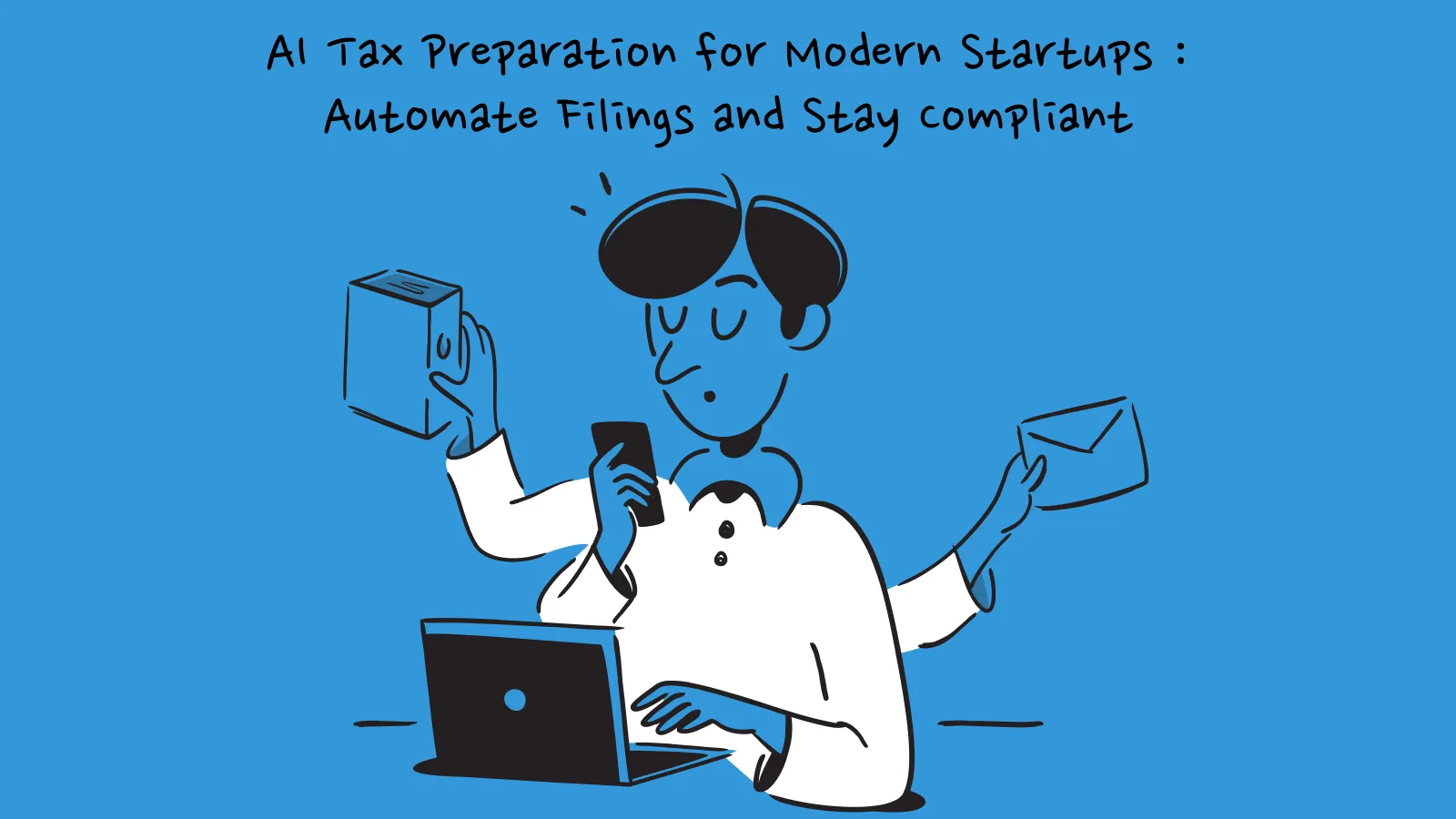AI Tax Preparation for Modern Startups : Automate Filings and Stay Compliant

AI tax preparation is changing how companies manage filings, calculations, and compliance work. Instead of spending hours collecting documents, interpreting rules, and checking numbers repeatedly, startups now use AI to process information, apply tax logic, and generate ready-to-file outputs in far less time. The shift is noticeable for founders who want predictable compliance without expanding their finance team.
The improvement goes beyond speed.
AI reduces the manual effort tied to reading receipts, updating tax rates, validating entries, and catching inconsistencies before they turn into filing errors. This helps companies maintain cleaner records throughout the year instead of scrambling during deadlines.
This article explains what AI tax preparation does behind the scenes, where these tools fit into real workflows, and how modern platforms support founders who want reliable compliance without unnecessary complexity.
What Does AI Tax Preparation Automate
AI tax preparation reduces the workload that slows founders during filing season. Instead of spending hours collecting documents, entering numbers, and checking rules manually, AI handles extraction, classification, rule application, and form population in the background.
This gives founders a cleaner starting point and reduces the errors, mismatches, and delays that usually appear close to deadlines.
i) Automated Extraction of Financial Documents
AI reads receipts, invoices, bank statements, payroll summaries, and vendor files using extraction models that identify dates, amounts, categories, and tax-relevant details. This removes the need for founders to dig through folders or match scattered documents, and it cuts down on mistakes caused by inconsistent formats.
ii) Auto-Population of Tax Forms Based on Rules
Once the data is collected, AI maps entries to the right parts of federal, state, and local forms. It applies the appropriate rules based on business type and jurisdiction, fills out core sections, and aligns figures across schedules. This reduces the time spent on repetitive form entry and lowers the chance of missing required fields.
iii) Real-Time Checks to Maintain Accuracy
As data flows in, AI runs validation checks. It identifies mismatches between documents and forms, applies updated tax rates, ensures totals align across schedules, and flags missing information. Founders get fewer late-stage surprises because issues are caught early instead of after the return is drafted.
iv) Faster Drafting for Multi-Entity or Cross-Border Setups
Founders managing cross-border operations or multiple entities spend even more time coordinating documents. AI organizes the data by entity, maps entries across jurisdictions, and highlights items that need human review. This reduces the manual workload for teams that handle US-India filings or multi-state operations.
A strong automation layer gives startups cleaner inputs before a human reviewer steps in. Instead of building the return manually, the focus shifts to reviewing exceptions, confirming treatments, and preparing for filing. This combination helps founders stay ahead of deadlines, reduce errors, and rely on numbers that stay consistent across the entire tax workflow.
AI Organizes Tax Documents Without Manual Sorting
AI fixes one of the biggest tax bottlenecks for founders: scattered documents. Receipts, invoices, payment confirmations, and bank statements often sit across email inboxes, downloads folders, messaging apps, and shared drives. AI brings order to this chaos by reading documents the moment they appear, extracting key details, and placing them in the correct category.
Here’s a quick comparison of document management with and without AI:-
AI Monitors Compliance Before Issues Become Penalties
Compliance failures usually occur because problems get discovered too late. Filing requirements evolve, deadlines shift, and supporting documents get overlooked. AI keeps track of these moving parts continuously so founders don’t rely on memory or manual checks.
How AI protects compliance proactively:
- AI monitors rule changes and updates tax rate logic automatically so filings stay aligned with current regulations.
- It checks documents for missing information and flags gaps long before filing day.
- It identifies mismatches across forms and schedules early, reducing the chance of late-stage corrections.
- It sends alerts for upcoming deadlines so founders avoid penalties and rushed submissions.
This transforms compliance from a once-a-year panic into a predictable, steady process.
AI Helps Founders Plan Tax Liabilities Earlier
Most founders only understand their tax exposure when filing season begins, which leaves no time to plan or adjust. AI improves this by analyzing financial activity throughout the year and predicting how it affects upcoming obligations.
Planning impact of AI at a glance:-
How AI Improves Compliance, Research, and Reporting
AI strengthens tax operations by giving founders faster access to rules, cleaner oversight, and more predictable reporting cycles. Instead of depending on manual checks or late-stage research, teams get accurate information throughout the year, which lowers the risk of penalties and reduces the pressure around filings.
i) Faster Access to Tax Rules and Guidance
AI helps founders and finance teams look up relevant tax rules in seconds. It scans large volumes of regulations, extracts the parts that apply to the business, and summarizes them in a clear format. This removes the time-consuming effort of searching through documents or browsing multiple sources.
How this helps:
- Teams get quick answers when preparing forms or reviewing transactions.
- Cross-border operations find country-specific rules without lengthy research.
- Founders make decisions with better clarity instead of guessing.
ii) Ongoing Tracking of Regulation Changes
Rules change often, and missing even a small update can lead to penalties. AI monitors new releases from authorities, identifies relevant changes, and alerts teams when something affects their filings.
What founders gain:
- Updated tax rates applied automatically.
- Early warnings about shifting deadlines or new reporting requirements.
- Fewer mistakes caused by outdated information.
iii) More Reliable Reporting With Less Rework
AI brings consistency to tax reporting by checking entries, forms, and schedules for alignment before filings are drafted. It catches mismatches or missing items early, which prevents manual rework at the end of the cycle.
What improves in reporting:
- Fewer last-minute corrections.
- Cleaner data feeding into returns and schedules.
- Faster reviews by bookkeepers or tax experts.
Founders see clearer value when they compare the workload before and after automation. AI reduces manual effort, speeds up checks, and improves accuracy in areas that normally require several review cycles.
When AI runs alongside the daily finance workflow, tax preparation becomes far smoother. Documents stay organized, compliance issues surface early, and founders get a clear view of upcoming liabilities instead of guessing. By the time a human reviewer steps in, most of the heavy work is complete, and the focus shifts to reviewing exceptions and confirming the final treatment. This gives founders accuracy, speed, and predictable filings—something most teams struggle to achieve manually.
How Inkle Supports AI Tax Preparation for Startups?
Cross-border operations add complexity to tax preparation because teams must align documents, rules, and deadlines across multiple jurisdictions. Inkle helps founders simplify this by combining AI automation with structured workflows that keep both US and India filings organized throughout the year. The result is a cleaner, more predictable tax process that removes much of the manual effort typically required from lean finance teams.
Inkle automates document extraction, organizes entries for both countries, and prepares the data needed for each tax form. It ensures that receipts, invoices, and statements from different regions follow a consistent structure so they can flow into forms without repeated back-and-forth corrections. This helps founders complete filings faster and reduce avoidable errors.
Founders use Inkle because it keeps the entire cross-border tax workflow steady, clear, and easy to manage:
- Documents from both countries are captured, sorted, and linked to the right entries.
- Tax form sections fill faster because the system applies the correct rules for each entity.
- Dashboards show what’s complete and what needs review before filing.
- AI-powered classification keeps receipts, invoices, and statements organized all year.
- Alerts highlight missing documents, mismatched entries, and upcoming deadlines.
- Chat support is available to resolve questions or clarify tax treatments quickly.
Book a demo to see how this flow works in real time. In this session, we’ll walk you through how Inkle handles repetitive work while human review ensures accuracy for global filings. It’s the simplest way to understand how Inkle keeps tax preparation fast, reliable, and ready for compliance reviews.
Frequently Asked Questions
What tasks can AI handle in tax preparation?
AI processes documents, extracts tax-relevant information, applies rules to each form, prepares draft returns, and runs validation checks. It also keeps documents organized so the final review is faster and more accurate.
How accurate is AI tax preparation?
AI reduces manual errors by keeping data consistent and applying updated rules automatically. A human reviewer is still needed for irregular entries, cross-border adjustments, and any item that depends on interpretation.
Is AI tax preparation helpful for small or remote finance teams?
Yes. AI removes most repetitive work, which helps lean teams stay organized without spending large amounts of time on document sorting, rule checking, or manual reviews.
Can AI tax tools manage international tax rules?
Advanced tools recognize country-specific requirements and apply the correct logic when populating forms. AI handles the groundwork, while human review ensures accuracy for cross-border filings.
What kind of ROI can I expect from AI tax preparation?
Companies usually save time on document processing, reduce filing errors, improve visibility into liabilities, and identify more deductions because their records stay cleaner throughout the year.
Does Inkle use AI in its tax filing platform?
Yes. Inkle integrates AI across document extraction, classification, and data preparation, especially for workflows involving US-India filings. Human reviewers complete the process to maintain accuracy and compliance.




.webp)